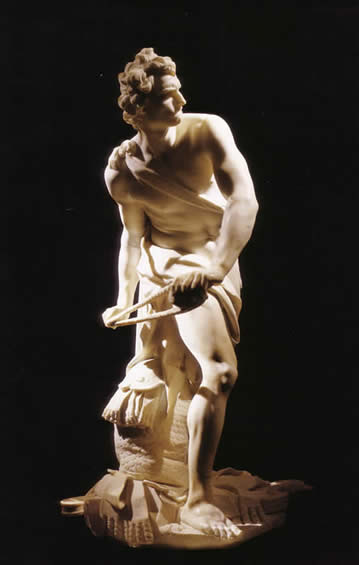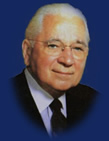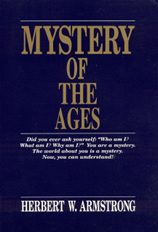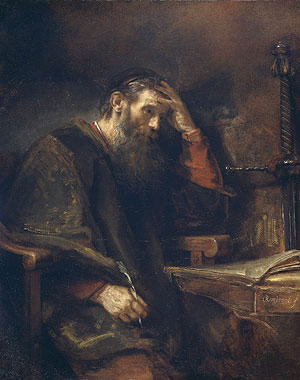


Chapter I
The Incredible Human Potential
And God said, “Let us make man
in Our image, after Our likeness...”
Genesis 1:26
T hree thousand years ago, King David of Israel advanced a question that goes to the very core of man’s existence. It is a question that has been pondered by the leading thinkers and philosophers down through the ages. This question has taken a variety of forms, but its intent is very clear. It seeks to identify the purpose for man – his reason for being.
When David presented his thoughts on this timeless puzzle, he saw man as infinitesimally small compared to the vastness of the universe. He then wondered why an infinite, incorruptible God would be so interested in finite, corruptible man. With this perspective, David ponders the meaning of life and specifically, mankind’s relationship to his Creator.
When I consider Thy heavens, the work of Thy fingers, the moon and the stars, which Thou hast ordained; what is man, that Thou art mindful of him? And the son of man, that Thou visit him? For Thou hast made him a little lower than the angels, and hast crowned him with glory and honor. Thou made him to have dominion over the works of Thy hands; Thou hast put all things under his feet: (Psa. 8:3-6)

David in his youth
For millennia man has questioned the meaning of life. He has wondered what he is and why he exists. This is understandable when one considers man’s uniqueness. The human family is extraordinary when compared to every other earthly being. For example: man has the capacity to create and dream. He is a cognitive being with the power to solve complex problems. Man can translate languages, compose music, alter environments, build architectural wonders, and even fly. Imagine that! Man can soar above the clouds and even into the darkness of space. He has actually set foot on another world a quarter of a million miles away.
In a very real sense, man is an explorer with an insatiable appetite for the unknown. The question is: WHY? Why would God place in him such extraordinary gifts? Why give him intellect and the power to think? Why give him emotions that can be touched? Why create in him the capacity to feel sorrow as well as joy, fear as well as contentment? And what about love? Why would the Great Creator and Sustainer of all that exists craft such a profound quality and entrust it to man? Finally, why did God make man in His image, after His likeness (Gen.1:26)? Is it possible to know the answers to these timeless questions? In short, what is man and why is God so mindful of him?
A Mystery of the Ages
Today we live in an age of “enlightenment” where knowledge is increasing at a frenetic pace. As a result of this growth of human understanding and wisdom, it has been estimated that with advances in science and technology, the accumulated knowledge of mankind doubles every three years. Imaging the learning.
Tragically, with all this growth in knowledge, man knows very little about himself. Oh, to be sure, the world has its theories. Libraries are filled with great works about the human mind and psyche. Universities throughout the globe have schools dedicated to understanding what makes man “tick.” But the stark reality is that the vast majority of people on earth have absolutely no clue as to why man is here, or where he is going.
To illustrate this point, consider just some of the ideas that have been advanced regarding where man goes after this life. The theories on this topic are truly prolific. For example: some believe the departed are reincarnated and take the form of other creatures. The particular creature one becomes is determined by the kind of life he or she has lived as a human being. Others believe the dead are in a state of perpetual contentment and bliss. Those in this condition simply gaze for all eternity at the beauty of God. Then there are those who see life as possessing no value at all other than the “here and now.” To them, when it’s over, it’s over.
The “Christian” View
Even in the professing Christian world, theories about the afterlife vary dramatically. Some believe the “saved” go immediately to heaven to be with the Lord. Others believe they serve time in some type of intermediate state in order to do penance for past sins. Others still, contend that the departed are held in some netherworld until their loved ones on earth perform the appropriate sacrament (such as baptism) on their behalf. There are even those who believe that some of the “saved” go to heaven while the rest of “saved” live for all eternity on a rebuilt earth.
Although the majority of “mainstream believers” are convinced that the departed faithful will go immediately to heaven, they also believe that at some point in the future, these believers will be reunited with their resurrected bodies, which will have been changed to a glorified body consisting of “flesh and bone”--this, despite the fact that the Bible clearly states that “flesh and blood cannot inherit the Kingdom” (1Cor. 15:50).
But what is the truth? Does the Bible reveal what happens to man after this mortal existence? Does God’s word provide a glimpse into eternity itself and man’s role in it? Just what is man and what is his ultimate Destiny?
An Extraordinary View
Herbert W. Armstrong was a prolific twentieth century author and teacher. He founded three colleges and was the creator and editor of one of the world’s most widely circulated magazines. Mr. Armstrong traveled the globe as an advocate of a Kingdom he believed God would one day bring to this earth. He also believed this Kingdom was the central theme of the gospel preached by Jesus Christ and His apostles.

Herbert W Armstrong
1892 - 1986
Mr. Armstrong had a very interesting view of man’s great potential and God’s purpose for him. In his book, Mystery of the Ages, he poses a remarkable possibility concerning man’s ultimate Destiny.
WHY did the Creator God put MAN on earth? For God’s ultimate supreme purpose of reproducing himself – of recreating himself as it were, by... creating... righteous divine character... in millions of unnumbered begotten and born children who shall become God beings, members of the God family. (Mystery of the Ages, pp. 102-103)

Mr. Armstrong would go on to postulate what those whom God has called would do--once they were literally born into His Divine Family.
Once this perfect and righteous character is instilled in man, and man converted from mortal flesh to immortal spirit, then is to come the INCREDIBLE HUMAN POTENTIAL – man being BORN into the divine FAMILY of God, restoring the government of God to the earth, and then participating in the completion of the CREATION over the entire endless expanse of the UNIVERSE. (Mystery of the Ages, p.103)
A Theory Dismissed
The belief that God would actually consider reproducing Himself in man has been rejected by the overwhelming majority of Christian denominations today. To them, such an idea seems inconceivable. After all, why would God do such a thing? Man is so frail. He is so corruptible and his life is so riddled with sin. The path man has taken since the dawn of time stands as incontrovertible proof that he is immeasurably inferior to the God who made him. What kind of candidate is he to assume rulership over the entire universe, as a God being no less?
Mr. Armstrong’s words have been vilified by leaders in the Protestant world as the utterance of an apostate teacher and a heretic. Even his successors view the idea of God reproducing Himself in man as the teaching of a cult and its leader a false prophet.
But is it possible Mr. Armstrong was right? Could the Great and Infinite Governor of Eternity have planned to literally recreate Himself – to make beings who are just like Him? The Bible strongly suggests that this is exactly what God is doing.
To Be Born Again
The Bible reveals an extraordinary Destiny for man. Jesus spoke of this Destiny at the beginning of His public ministry. It was during the days of the Passover. At that time, He was in Jerusalem and was approached by a leader of the Jews named Nicodemus. This meeting is recorded in the third chapter of John’s gospel. Notice what takes place.
There was a man of the Pharisees, named Nicodemus, a ruler of the Jews: The same came to Jesus by night, and said unto Him, “Rabbi, we know that You art a teacher come from God: for no man can do these miracles that You do, except God be with Him. (Jn. 3:1-2)
No sooner had Nicodemus finished his greeting than Jesus began to introduce one of the most radical ideas ever uttered.
Jesus answered and said unto him, “Verily, verily, I say unto thee, Except a man be born again, he cannot see the kingdom of God. (Jn. 3:3)
Here, Jesus was explaining to this prominent religious leader that entrance into God’s Kingdom was predicated on man going through a dramatic change. He would have to be born into it. Furthermore, absent this birth, one could never even obtain a glimpse of that Kingdom.
When Nicodemus heard Jesus’ words he must have been mystified. How could such a birth be possible? And why would Jesus make what appeared to be such an outrageous pronouncement, “except a man be born again, he cannot see the Kingdom of God”? What could Jesus have possibly meant in uttering these words?
At this point it is important to understand that Nicodemus clearly understood the terminology the Messiah was employing. He was not confused about grammar or syntax. After all, he (Nicodemus) was a highly educated man. Not only was he a prominent rabbi, but in all likelihood he was also a member of the Sanhedrin, the high court of the Jews at that time. Despite these credentials, Nicodemus simply couldn’t comprehend how such a birth could take place. As a result, he sought clarification from a man he called “a teacher from God.”
Nicodemus saith unto Him, “How can a man be born when he is old? Can he enter the second time into his mother’s womb and be born?” (Jn. 3:4)
When Nicodemus advanced this query he was not trying to be clever. He was not mocking Jesus or His words. On the contrary, Nicodemus was very serious. However, he also was struggling with what Jesus could possibly mean by insisting that man be “born again” in order to enter into the Kingdom of God. Therefore, he pressed the Messiah to expand on His statement regarding a second birth.
The meeting between Nicodemus and Jesus as recorded by the apostle John, has been analyzed by some of the premier religious minds of our day. These great thinkers have attempted to gain insight into this “rebirth” by copiously scrutinizing Jesus’ words. They have vigorously dissected the term “born again” and crafted a meaning that is used today to describe millions of professing Christians. In the Protestant world, a person is “born again” when he or she accepts Jesus Christ as his or her personal Lord and Savior.
However, as important as accepting Jesus Christ as Lord and Savior is: will such an act make you “born again?” Just what did Jesus mean when He presented this profound truth about entrance into God’s Kingdom?
Eye Witness Testimony
It is important to understand that there was an eye witness to this meeting. This eye witness was Nicodemus himself. He heard firsthand what Jesus was saying. And contrary to popular belief, when doing so, he never once asked what “born again” meant. Notice Nicodemus did not ask “what?” but rather “how?” when questioning Jesus about this lesson. His precise words were “How can a man be born when he is old?" -- not “what do the words ‘born again’ mean?” Furthermore, at no time did Nicodemus question Jesus about the meaning of Greek verbs or Aramaic terms (the language Jesus was probably speaking at the time).
The point here is that Nicodemus understood Jesus’ teaching regarding being “born again” as referring to a literal birth, as opposed to some “religious experience” or abstract spiritual concept. To Nicodemus, Jesus was describing something that was very real, not figurative or symbolic – and the truth be known, Nicodemus was correct in his understanding. Where Nicodemus was wrong was that he thought this literal birth was physical. Ironically, this is the same mistake made by the vast majority of professing Christians today. If you were to ask them about what happens to those who are resurrected form the dead at the last trump, they will tell you that at that time, God’s people will be given a glorified physical body comprised of flesh and bone. However, Jesus said something quite different. Notice His response to Nicodemus’ query.
Jesus answered, “Verily, verily, I say unto thee, Except a man be born of water and of the spirit, he cannot enter into the kingdom of God.” (Jn. 3:5)
Jesus then contrasts a fleshly existence with a spiritual existence. Notice His words.
That which is born of the flesh is flesh; and that which is born of the Spirit is spirit. (Jn. 3:6)
Here Jesus is being very direct. Flesh comes from flesh and spirit comes from spirit. Therefore, because mankind is currently in a fleshly state by virtue of his physical birth, he cannot at this time be “born again.” However, Jesus also indicated that there is a spiritual state that is entered into as a direct result of a spiritual birth. A birth that is very real.
There are many who believe they are “born again” as a result of their conversion. But such an understanding contradicts Jesus’ words. Remember, Jesus not only contrasted a physical birth to a spiritual birth; He also explained what it would be like to be born of the Spirit. Notice what He said to Nicodemus.
Marvel not that I said unto thee, Ye must be born again. The wind blows where it listeth, and you hear the sound thereof, but can not tell whence it cometh, and whither it goes: so is every one that is born of the Spirit. (Jn. 3:7-8)
Here, Jesus was explaining that when one is literally “born again,” they are no longer composed of corruptible matter, but rather of incorruptible spirit. They are like the wind. Their presence can be felt, but not contained in the way that physical matter can.
The point Jesus was conveying to Nicodemus, and to all of mankind for that matter, is that God has planned a Kingdom that was never designed to be inhabited by the physical realm. God’s Kingdom is a spiritual Kingdom and its citizens will literally be made of spirit.
From Conception to Birth
To be sure, being “born again” is the culmination of a process that begins during this physical existence. Like a human life that begins at conception, the spiritual life that gains entrance into God’s Kingdom also begins at conception. This conception takes place upon man’s conversion. At this time the true believer receives a small portion of God’s holy spirit. This spirit is nourished by yielding to the Father and drawing closer to Him. As a result of this nourishment, God’s spirit grows until it becomes fully mature.
At the resurrection, God’s holy spirit which was was nurtured by obedience to Him will have reached full maturity. At that time man will be born into the magnificent Family of his Creator. This is a literal Family of spirit beings, each with a unique personality, but possessing a form that is made of incorruptible properties, and a virtue that is like that of God Himself. Contrary to what is commonly taught in professing Christianity, those born into God’s Family are not going to be composed of glorified flesh and bone, but rather of incorruptible glorified spirit.
The Testimony of Others
If Jesus’ words regarding being “born again” were the only ones contained in the scriptures, they would be enough. However, other champions of the faith also declared this marvelous truth regarding the change that man must experience prior to entering God’s Kingdom. The apostle Paul taught about this change to the church at Corinth. Notice what this great champion was inspired to write.
Now this I say, brethren, that flesh and blood cannot inherit the kingdom of God; neither doth corruption inherit incorruption. (1Cor. 15:50)
Here Paul states with great clarity that the corruptible world, of which mankind is a part, is not compatible with the incorruptible world to which mankind is destined. Furthermore, in the very next verse, Paul explains how those called according to God’s purpose will enter into this incorruptible Kingdom.
Behold, I show you a mystery; We shall not all sleep, but we shall all be changed, In a moment, in the twinkling of an eye, at the last trump: for the trumpet shall sound, and the dead shall be raised incorruptible, and we shall be changed. (1Cor. 15:51-52)

The Apostle Paul, c. 1657
Rembrandt van Rijn
National Gallery of Art, Washington, Widener Collection
The moment Paul is describing in this verse represents the great hope of all true believers. It is a time when everything in man that is weak – the body, the mind and even man’s character – will be changed to a perfect state. At this time man will take his first steps into eternity.
But Paul spoke even further about the great hope of this moment, when God’s people will be changed from mortal to immortal. When writing to the church at Thessalonica, he provides additional insight into the resurrection of the dead and the change that God’s people will experience. Here Paul even describes the order in which this community of believers will be changed from mortal flesh to immortal spirit.
For this we say unto you by the word of the Lord, that we which are alive and remain unto the coming of the Lord shall not prevent them which are asleep. For the Lord Himself shall descend from heaven with a shout, with the voice of the archangel, and with the trump of God: and the dead in Christ shall rise first. Then we which are alive and remain shall be caught up together with them in the clouds, to meet the Lord in the air: and so shall we ever be with Lord. (1Th. 4:15-17)
Here Paul is stating that the thousands of saints who have died in the faith down through the ages will not be denied this extraordinary rebirth. They will, in fact, experience it first, followed immediately by those who are alive when Christ returns. This is the moment Jesus spoke about to Nicodemus. It is a time of birth, of new beginnings, as citizens of a realm without limits. In that realm God’s children will be like Him. They will possess His spiritual genetic code. The apostle Peter described it this way in an epistle that bears his name.
Whereby are given unto us exceeding great and precious promises; that by these you might be partakers of the divine nature, having escaped the corruption that is in the world through lust. (2Pe. 1:4)
The nature Peter was describing is more than God’s perfect, righteous character. It also includes being made of incorruptible spirit just like God Himself. In short, Peter was explaining that at the time of this re-birth into God’s Kingdom, these glorified saints will have God’s entire nature. This would include His CHARACTER and His FORM. Imagine such a Destiny! Imagine being like the very Being who created you! As difficult as it is to comprehend, this profound truth is real. The world may reject it, but it is no less true. God’s people will be just like Him.
The Testimony of a Friend
The apostle John, who was arguably the best friend of the Messiah, expressed what it would be like to be truly “born again” in words that couldn’t be more clear. Notice the power and majesty of man’s Destiny so eloquently expressed by this apostle.
Beloved, now are we the sons of God, and it doth not yet appear what we shall be: but we know that, when He shall appear, we shall be like Him; for we shall see Him as He is (1Jn. 3:2)
Imagine being just like God. But that is precisely what John is saying. His words are clear and direct. Although mankind is currently in a state that is so infinitely inferior to his Creator, he will one day be able to share a common nature with the Greatest Being in existence. Man will be like God.
The Bible declares that once “born again,” man’s awareness of the infinite will be similar to that of his Heavenly Father. This remarkable truth is revealed in one of the most cited chapters in all the Bible. In the thirteenth chapter of First Corinthians, Paul contrasts man’s present knowledge to the knowledge he will possess when his change comes.
For now we see through a glass, darkly; but then face to face: now I know in part; but then shall I know even as also I am known. (1Cor. 13:12)
Here, Paul states that those who are ultimately “born again,” will know the very Creator God as He knows them. This is a powerful claim, but it is clearly what Paul is stating in this verse. This servant of God does not qualify his words. There are no caveats, no fine print – just a simple statement about man’s wisdom as a “born again” member of God’s Family. Those who reach this state will know as much about the Creator and Sustainer of the universe as He knows about them. Now consider this: how much does God know about man?
Jesus once said that the Father knows every hair on man’s head. That alone should establish God’s credentials as the undisputed authority on the human family. But God’s knowledge goes much further. There is no wisdom that man possesses of which God is not totally cognizant. The Eternal knows everything. He is aware of man’s most intimate thoughts. He knows man’s hopes, his dreams, his loves and his fears. God is the Master Architect of all that exists, and that includes man. In short, God truly knows what makes man what he is.
When Paul wrote these words, he was saying that the time is coming when those born into God’s Kingdom will know God in a way that is inconceivable to mortal man at this time. This is because in this life, man’s knowledge of his Creator is flawed.
However, the time is coming when man’s understanding of God will be perfect and complete. God’s children will know every facet of this Infinite Being. They will know His dreams and His hopes. They will be aware of His wisdom and His virtue. They will understand the great mysteries that have been woven throughout time and space. In short, man will comprehend the infinite. How is that for a future? This is the potential the Great God has planned for the human family. Man is going to be “just like Him.”
This Destiny should fill every true believer with immense hope and excitement and great anticipation. God’s people should long for the day when they will truly be “born again.” The great patriarch David, who will be king over all of Israel (Ezk. 34:23) in God’s Kingdom, looked forward to the time when his change would come. Here is what David wrote.
As for me, I will behold Thy face in righteousness: I shall be satisfied, when I awake, with Thy likeness. (Psa. 17:15)
As incredible as it is to imagine, God’s purpose for man is as infinite as God himself. The great Destiny that awaits those who yield to Him is that they will be just like Him: incorruptible, all-powerful, with perfect, righteous character. And there is a reason for this. These are the tools man will need to govern with God for all eternity. No less will do. But the story continues...